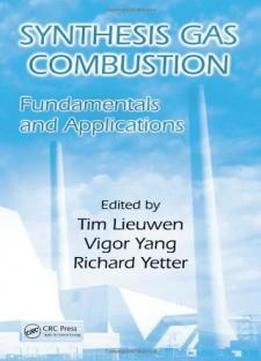
Synthesis Gas Combustion: Fundamentals And Applications
by Richard Yetter /
2009 / English / PDF
8.5 MB Download
Coal, still used to generate more than half of the electric power
in the U.S., will likely be part of any future global energy
plan. But this finite resource is also responsible for 80 percent
of the CO2 emissions from power production, and its continued use
will require improved processing techniques that are less
damaging to the environment and less costly. One viable option is
the use of "clean coal" energy conversion devices that rely on
the combustion of gasified coal, referred to as synthesis gas, or
syngas.
Coal, still used to generate more than half of the electric power
in the U.S., will likely be part of any future global energy
plan. But this finite resource is also responsible for 80 percent
of the CO2 emissions from power production, and its continued use
will require improved processing techniques that are less
damaging to the environment and less costly. One viable option is
the use of "clean coal" energy conversion devices that rely on
the combustion of gasified coal, referred to as synthesis gas, or
syngas.Synthesis Gas Combustion: Fundamentals and
Applications
Synthesis Gas Combustion: Fundamentals and
Applications presents work from leading combustion
authorities who offer their perspectives on various energy and
environmental issues linked to the development of syngas and
hydrogen combustion. This volume summarizes the current
understanding of syngas, focusing first on combustion
fundamentals and then on issues specific to application and
utilization in fuel cells, internal combustion engines, and
steady-flowing combustion devices such as gas turbines or
boilers. In discussing syngas production, this book details the
technical issues and trade-offs that influence fuel composition.
It also explores combustion fundamentals of "clean coal"
technologies, including chemical kinetics, flame properties, and
emissions.
presents work from leading combustion
authorities who offer their perspectives on various energy and
environmental issues linked to the development of syngas and
hydrogen combustion. This volume summarizes the current
understanding of syngas, focusing first on combustion
fundamentals and then on issues specific to application and
utilization in fuel cells, internal combustion engines, and
steady-flowing combustion devices such as gas turbines or
boilers. In discussing syngas production, this book details the
technical issues and trade-offs that influence fuel composition.
It also explores combustion fundamentals of "clean coal"
technologies, including chemical kinetics, flame properties, and
emissions.
Governments and companies around the world are devoting
significant resources to improve understanding of the combustion
of coal and bio-derived synthesis gases, to maximize the benefits
of gasification technology and limit CO2 emissions. This valuable
reference provides state-of-the-art context and technical
information needed to develop clean energy systems. These include
clean coal technologies, hydrogen and liquid fuel production, use
of biomass feedstocks, and usage in fuel cells and other advanced
power generation technologies.
Governments and companies around the world are devoting
significant resources to improve understanding of the combustion
of coal and bio-derived synthesis gases, to maximize the benefits
of gasification technology and limit CO2 emissions. This valuable
reference provides state-of-the-art context and technical
information needed to develop clean energy systems. These include
clean coal technologies, hydrogen and liquid fuel production, use
of biomass feedstocks, and usage in fuel cells and other advanced
power generation technologies.











